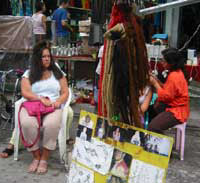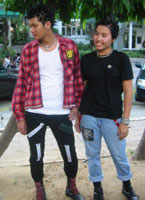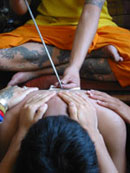Out of Context
Things can be quite the opposite from one’s expectations of how they should be in Thailand. For example, once I was preparing to drive over a mountain off in middle-of-nowhere rural Thailand in a pick-up track packed with locals. I was excited to enjoy some peace and quiet. The driver, who was wearing a longyi, started his engine and proceeded to pop in a tape of smash-hit techno club songs from New York City. As the lush greenery passed, the speakers (right along with my eardrums) nearly exploded from the volume. It just didn’t seem fitting.
Thailand seems to specialise in absorbing other cultures into itself without batting an eye, leaving a potpourri of customs, cultures and fashions all floating around on the streets in a medley of unique strangeness. Traditional dress walks side-by-side with tiny T-shirts and skintight jeans. Football (soccer) matches receive more attention than Traditional Thai Boxing (Muey Thai) championship fights.
Thailand contains an amazingly diverse mixture of nationalities and religions. Chinese, Burmese, Laotian, Cambodian, Shan and a host of other ethnic minorities and hilltribes all contribute to the cultural tapestry of the nation. Add to that the hundreds of thousands of tourists and expatriates putting in their cultural two-cents worth and you’ve got quite a jumble on your hands at times.
amazingly diverse mixture of nationalities and religions. Chinese, Burmese, Laotian, Cambodian, Shan and a host of other ethnic minorities and hilltribes all contribute to the cultural tapestry of the nation. Add to that the hundreds of thousands of tourists and expatriates putting in their cultural two-cents worth and you’ve got quite a jumble on your hands at times.
McDonalds, Coca Cola and Kentucky Fried Chicken can pop up in the oddest locations but one gets used to this corporate globalisation in time. Thais with dreadlocks, foreigners wearing traditional hilltribe costumes, 70s disco wear in rural villages, the Titanic soundtrack, Mohawk hair styles, hotdogs and bands covering western smash hits have the habit of popping up where one least expects them to.
Will the ‘Thainess’ of Thailand simply vanish over time? If one walks around the capital city, the picture looks bleak indeed. The impact of tourism also takes its toll. A visitor to Thailand who does not venture into remote areas has the option of eating food from their own country every night and does not need to speak one word of Thai to get around. Visitors can also take self-hypnosis, Reiki, yoga, massage or cooking classes, all of which are taught in English. Getting beads put in one’s hair, signing up for a permanent or temporary tattoo, or tracking down good cheese and wine is an easy thing to do but has almost nothing to do with Thai culture.
not venture into remote areas has the option of eating food from their own country every night and does not need to speak one word of Thai to get around. Visitors can also take self-hypnosis, Reiki, yoga, massage or cooking classes, all of which are taught in English. Getting beads put in one’s hair, signing up for a permanent or temporary tattoo, or tracking down good cheese and wine is an easy thing to do but has almost nothing to do with Thai culture.
Thais are proud of their nation and proud to be Thai. This was clearly illustrated by the current Prime Minister’ political party’s name: ‘Thai Rak Thai’ (Thais love Thais), but over time the core cultural values of Thailand are destined to change as western influence becomes stronger and stronger. It is Thailand’s downright friendliness and accepting nature that is its crowning glory and curse if you ask me.
The backbone of Thai culture is found in its rural villages but even they are far from being unscathed. The most important of Thai values is taking care of one’s parents and family and families are beginning to erode, also. As the younger generation watches western TV and films, praises the food of Ronald McDonald more than mom’s home cooking, and breaking the rules becomes more fashionable, I am forced to wonder what Thailand’s cultural tapestry will look like in the next few decades. The potential for a unique cultural vacuum lingers.
The most important of Thai values is taking care of one’s parents and family and families are beginning to erode, also. As the younger generation watches western TV and films, praises the food of Ronald McDonald more than mom’s home cooking, and breaking the rules becomes more fashionable, I am forced to wonder what Thailand’s cultural tapestry will look like in the next few decades. The potential for a unique cultural vacuum lingers.
I catch myself sometimes doing something I swore I would never do: using the phrase ‘Kid’s these days!’ Traditional Thailand says baring one’s shoulders is impolite, premarital sex is not acceptable, illegal substances should not be consumed and kids should obey their parents’ guidelines and rules. This, of course, means that rebellious kids are walking around wearing napkins for T-shirts, popping drugs, having premarital sex and staying out late at night. And there are more of them than you might think. The problem is not the act of rebellion in itself, but the fact that they are giving up their culture while adopting a new western-styled one that they hardly know anything about.
A recent outing to a Thai metal concert in Bangkok proved fascinating for the author. Audience members sported the most daring and provocative of rebellious clothing. Some wore gasmasks, other donned prison suits. Hundreds of western band names paraded around on T-shirts, some of them from the neo-nazi music movement.
The vast majority of Thais outside tourist areas have very little or no understanding of the English language. How can one support a western band singing in English, even have its name tattooed across your chest, if you don’t understand the band’s lyrics or message? This is but one symbolic example of the much larger problem: adopting western culture without understanding what it is or the implications involved in doing so.
